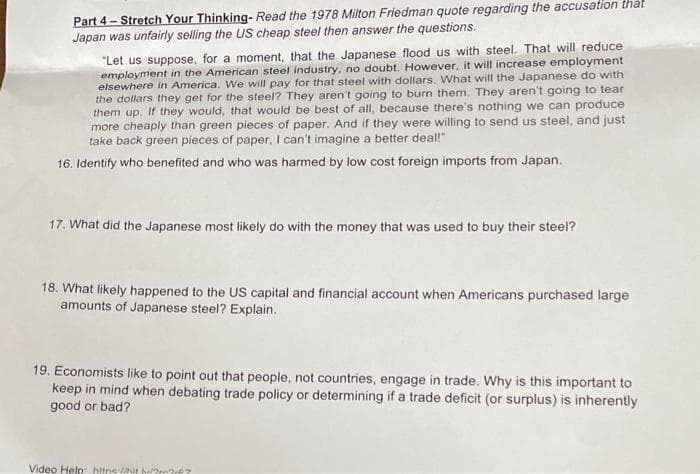Part 4-Stretch Your Thinking-Read the 1978 Milton Friedman quote regarding Japan was unfairly selling the US cheap steel then answer the questions. "Let us suppose, for a moment, that the Japanese flood us with steel. That will reduce employment in the American steel industry, no doubt. However, it will increase employment elsewhere in America. We will pay for that steel with dollars. What will the Japanese do with the dollars they get for the steel? They aren't going to burn them. They aren't going to tear them up. If they would, that would be best of all, because there's nothing we can produce more cheaply than green pieces of paper. And if they were willing to send us steel, and just take back green pieces of paper, I can't imagine a better deal!" 16. Identify who benefited and who was harmed by low cost foreign imports from Japan. 17. What did the Japanese most likely do with the money that was used to buy their steel? 18. What likely happened to the US capital and financial account when Americans purchased large amounts of Japanese steel? Explain. 19. Economists like to point out that people, not countries, engage in trade. Why is this important to keep in mind when debating trade policy or determining if a trade deficit (or surplus) is inherently good or bad?
Part 4-Stretch Your Thinking-Read the 1978 Milton Friedman quote regarding Japan was unfairly selling the US cheap steel then answer the questions. "Let us suppose, for a moment, that the Japanese flood us with steel. That will reduce employment in the American steel industry, no doubt. However, it will increase employment elsewhere in America. We will pay for that steel with dollars. What will the Japanese do with the dollars they get for the steel? They aren't going to burn them. They aren't going to tear them up. If they would, that would be best of all, because there's nothing we can produce more cheaply than green pieces of paper. And if they were willing to send us steel, and just take back green pieces of paper, I can't imagine a better deal!" 16. Identify who benefited and who was harmed by low cost foreign imports from Japan. 17. What did the Japanese most likely do with the money that was used to buy their steel? 18. What likely happened to the US capital and financial account when Americans purchased large amounts of Japanese steel? Explain. 19. Economists like to point out that people, not countries, engage in trade. Why is this important to keep in mind when debating trade policy or determining if a trade deficit (or surplus) is inherently good or bad?
Principles of Macroeconomics (MindTap Course List)
7th Edition
ISBN:9781285165912
Author:N. Gregory Mankiw
Publisher:N. Gregory Mankiw
Chapter3: Interdependence And The Gains From Trade
Section: Chapter Questions
Problem 9PA
Related questions
Question

Transcribed Image Text:Part 4-Stretch Your Thinking- Read the 1978 Milton Friedman quote regarding the accusation that
Japan was unfairly selling the US cheap steel then answer the questions.
"Let us suppose, for a moment, that the Japanese flood us with steel. That will reduce
employment in the American steel industry, no doubt. However, it will increase employment
elsewhere in America. We will pay for that steel with dollars. What will the Japanese do with
the dollars they get for the steel? They aren't going to burn them. They aren't going to tear
them up. If they would, that would be best of all, because there's nothing we can produce
more cheaply than green pieces of paper. And if they were willing to send us steel, and just
take back green pieces of paper, I can't imagine a better deal!"
16. Identify who benefited and who was harmed by low cost foreign imports from Japan.
17. What did the Japanese most likely do with the money that was used to buy their steel?
18. What likely happened to the US capital and financial account when Americans purchased large
amounts of Japanese steel? Explain.
19. Economists like to point out that people, not countries, engage in trade. Why is this important to
keep in mind when debating trade policy or determining if a trade deficit (or surplus) is inherently
good or bad?
Video Help: https://hit ???
Expert Solution
This question has been solved!
Explore an expertly crafted, step-by-step solution for a thorough understanding of key concepts.
This is a popular solution!
Trending now
This is a popular solution!
Step by step
Solved in 6 steps

Knowledge Booster
Learn more about
Need a deep-dive on the concept behind this application? Look no further. Learn more about this topic, economics and related others by exploring similar questions and additional content below.Recommended textbooks for you

Principles of Macroeconomics (MindTap Course List)
Economics
ISBN:
9781285165912
Author:
N. Gregory Mankiw
Publisher:
Cengage Learning

Principles of Economics, 7th Edition (MindTap Cou…
Economics
ISBN:
9781285165875
Author:
N. Gregory Mankiw
Publisher:
Cengage Learning

Principles of Microeconomics (MindTap Course List)
Economics
ISBN:
9781305971493
Author:
N. Gregory Mankiw
Publisher:
Cengage Learning

Principles of Macroeconomics (MindTap Course List)
Economics
ISBN:
9781285165912
Author:
N. Gregory Mankiw
Publisher:
Cengage Learning

Principles of Economics, 7th Edition (MindTap Cou…
Economics
ISBN:
9781285165875
Author:
N. Gregory Mankiw
Publisher:
Cengage Learning

Principles of Microeconomics (MindTap Course List)
Economics
ISBN:
9781305971493
Author:
N. Gregory Mankiw
Publisher:
Cengage Learning

Principles of Economics (MindTap Course List)
Economics
ISBN:
9781305585126
Author:
N. Gregory Mankiw
Publisher:
Cengage Learning

Essentials of Economics (MindTap Course List)
Economics
ISBN:
9781337091992
Author:
N. Gregory Mankiw
Publisher:
Cengage Learning

Principles of Macroeconomics (MindTap Course List)
Economics
ISBN:
9781305971509
Author:
N. Gregory Mankiw
Publisher:
Cengage Learning